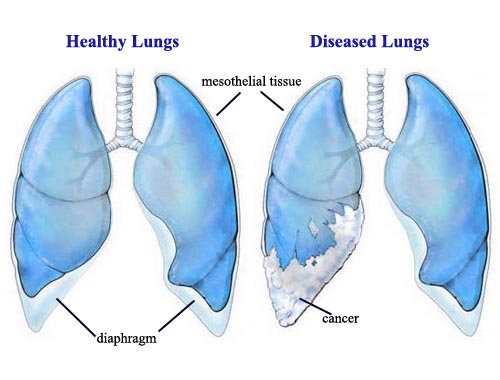Mesothelioma

Published: 18 Jun 2025
ICD9: 163.9 ICD10: C38.4 ICD11: 2F10
Mesothelioma is a rare and aggressive cancer that primarily affects the lining of the lungs, abdomen, or heart.
It's almost exclusively caused by exposure to asbestos. Let's break it down:
![]() What it is: A type of cancer. Cancer occurs when cells grow uncontrollably and spread to other parts of the body.
What it is: A type of cancer. Cancer occurs when cells grow uncontrollably and spread to other parts of the body.
![]() Where it occurs:
Where it occurs:![]()

![]() Pleural mesothelioma: The most common type, affecting the lining of the lungs (the pleura).
Pleural mesothelioma: The most common type, affecting the lining of the lungs (the pleura).![]()

![]() Peritoneal mesothelioma: Affects the lining of the abdomen (the peritoneum).
Peritoneal mesothelioma: Affects the lining of the abdomen (the peritoneum).![]()

![]() Pericardial mesothelioma: Affects the lining around the heart (the pericardium), which is very rare.
Pericardial mesothelioma: Affects the lining around the heart (the pericardium), which is very rare.![]()

![]() Testicular mesothelioma: The rarest form, affecting the lining of the testicles.
Testicular mesothelioma: The rarest form, affecting the lining of the testicles.
![]() Cause: Almost always caused by exposure to asbestos. Asbestos fibers, when inhaled or swallowed, can become lodged in the lining of these organs, leading to inflammation and eventually cancer.
Cause: Almost always caused by exposure to asbestos. Asbestos fibers, when inhaled or swallowed, can become lodged in the lining of these organs, leading to inflammation and eventually cancer.
![]() Latency period: Mesothelioma typically takes 20-50 years (or more) to develop after asbestos exposure. This long latency period makes diagnosis challenging.
Latency period: Mesothelioma typically takes 20-50 years (or more) to develop after asbestos exposure. This long latency period makes diagnosis challenging.
![]() Symptoms: Symptoms vary depending on the location of the cancer, but can include:
Symptoms: Symptoms vary depending on the location of the cancer, but can include:![]()

![]() Pleural mesothelioma: Chest pain, shortness of breath, fluid buildup around the lungs (pleural effusion), cough, fatigue, weight loss.
Pleural mesothelioma: Chest pain, shortness of breath, fluid buildup around the lungs (pleural effusion), cough, fatigue, weight loss.![]()

![]() Peritoneal mesothelioma: Abdominal pain, swelling, fluid buildup in the abdomen (ascites), nausea, vomiting, weight loss.
Peritoneal mesothelioma: Abdominal pain, swelling, fluid buildup in the abdomen (ascites), nausea, vomiting, weight loss.![]()

![]() Pericardial mesothelioma: Chest pain, irregular heartbeat, shortness of breath.
Pericardial mesothelioma: Chest pain, irregular heartbeat, shortness of breath.
![]() Diagnosis: Diagnosis involves a combination of imaging tests (like X-rays, CT scans, MRI), and a biopsy (taking a tissue sample for examination under a microscope).
Diagnosis: Diagnosis involves a combination of imaging tests (like X-rays, CT scans, MRI), and a biopsy (taking a tissue sample for examination under a microscope).
![]() Treatment: Treatment options depend on the stage and location of the cancer, as well as the patient's overall health. They can include:
Treatment: Treatment options depend on the stage and location of the cancer, as well as the patient's overall health. They can include:![]()

![]() Surgery: To remove the tumor or parts of the lining.
Surgery: To remove the tumor or parts of the lining.![]()

![]() Chemotherapy: Using drugs to kill cancer cells.
Chemotherapy: Using drugs to kill cancer cells.![]()

![]() Radiation therapy: Using high-energy rays to kill cancer cells.
Radiation therapy: Using high-energy rays to kill cancer cells.![]()

![]() Immunotherapy: Using the body's own immune system to fight cancer.
Immunotherapy: Using the body's own immune system to fight cancer.![]()

![]() Palliative care: Focused on relieving symptoms and improving quality of life.
Palliative care: Focused on relieving symptoms and improving quality of life.
![]() Prognosis: Mesothelioma is generally considered an aggressive cancer with a poor prognosis. However, advancements in treatment are being made, and some patients may live longer with treatment.
Prognosis: Mesothelioma is generally considered an aggressive cancer with a poor prognosis. However, advancements in treatment are being made, and some patients may live longer with treatment.
Important points to remember:
![]() Asbestos is the primary cause: If you have been exposed to asbestos, it's important to be aware of the risk and talk to your doctor about potential screening and monitoring.
Asbestos is the primary cause: If you have been exposed to asbestos, it's important to be aware of the risk and talk to your doctor about potential screening and monitoring.
![]() Early detection is key: While mesothelioma is difficult to cure, early detection can improve treatment outcomes.
Early detection is key: While mesothelioma is difficult to cure, early detection can improve treatment outcomes.
![]() Support is available: There are many organizations and support groups that can provide information, resources, and emotional support to patients and their families.
Support is available: There are many organizations and support groups that can provide information, resources, and emotional support to patients and their families.
![]() This information is for general knowledge and informational purposes only, and does not constitute medical advice. It is essential to consult with a qualified healthcare professional for any health concerns or before making any decisions related to your health or treatment.*
This information is for general knowledge and informational purposes only, and does not constitute medical advice. It is essential to consult with a qualified healthcare professional for any health concerns or before making any decisions related to your health or treatment.*